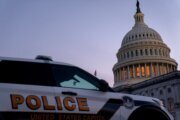LANCASTER, Pa. (AP) — On a recent weekday afternoon, an Amish man in a horse-drawn buggy navigated through a busy intersection of auto traffic in Pennsylvania’s Lancaster County, past a billboard proclaiming: “Pray for God’s Mercy for Our Nation.”
The billboard featured a large image of a wide-brimmed straw hat often worn by the Amish. If there was any further doubt as to its target audience, the smaller print listed the sponsor as “Fer Die Amische” — referring to the Amish in their Pennsylvania German dialect.
Researchers say most of the Amish don’t register to vote, reflective of the Christian movement’s historic separatism from mainstream society, just as they’ve maintained their dialect and horse-and-buggy transportation.
But a small minority have voted, and the Amish are most numerous in the all-important swing state of Pennsylvania. So they’re being targeted this year in the latest of decades of efforts to register more of them to vote.
Republicans are seeking their votes through billboards, ads, door-to-door canvassing and community meetings. Republican campaigners see the Amish as receptive to GOP talking points — smaller government, less regulation, religious freedom.
“They just want government to stay not only out of their businesses but out of their religion,” said U.S. Rep. Lloyd Smucker, R-Pa., whose district includes Lancaster County, at the heart of the nation’s largest Amish population. Smucker, whose own family background is Amish, predicted a dramatic increase in the Amish vote, “basing that on the enthusiasm we see.”
Most Amish don’t vote, but every vote matters in a swing state
But while such efforts could yield an increase, don’t expect the Amish vote to dramatically swing the Keystone State’s bottom line, said Steven Nolt, director of the Young Center for Anabaptist and Pietist Studies at Elizabethtown College in Lancaster County.
“For most Amish history and in most Amish communities today, Amish people don’t vote,” he said. “They haven’t voted, they’re not voting, and I think it’s safe to say in the near future we wouldn’t expect them to.”
But Amish in a handful of settlements in Lancaster and elsewhere have voted, typically less than 10% of their population, Nolt said. He has overseen post-election analyses of voting registration trends in areas with significant Amish populations — painstaking research that involves cross-checking voter rolls and church directories by hand and can’t be conducted in real time during an election.
There are currently about 92,000 Amish of all ages in Pennsylvania, according to the Young Center’s research, which is based on a number of sources, including almanacs, newspapers, and directories. About half are in the Lancaster area and the rest dispersed around the state.
But in a community with many children, less than half the Amish are of voting age, Nolt said. In 2020, he estimated that about 3,000 Amish voted in the Lancaster area, and several hundred elsewhere, he said.
“Even if we would imagine, for example, that here in Lancaster, there would be a tremendous percentage in percentage terms … we’re looking at several hundred to maybe a thousand additional voters,” he said.
On its own, that cannot come close to flipping a state that went for Democrat Joe Biden in 2020 by about 80,000 votes.
Of course, the Amish are hardly the only religious or ethnic constituency being courted by candidates. “In a context where every vote counts, every vote counts,” Nolt said. “But no, we’re not talking tens of thousands of Amish votes.”
Still, Smucker is optimistic about a larger turnout. He said Republican messages resonate with a changing Amish community.
“It was once more agrarian, but they’ve long ago run out of land in Lancaster County,” he said. Only a minority are still in farming, with many starting small businesses, where the Republican emphasis on limited regulation is appealing. Plus, he said, the Amish community perceives Republicans as more friendly to religious liberty and opposed to abortion.
He said Amish tell stories of how their forebears were more likely to vote in the 1950s during controversies about compulsory school policies, but the practice has decreased since then.
Wayne Wengerd, Ohio state director of the Amish Steering Committee, which navigates relations between Amish community leaders and government officials, recalls registration efforts as far back as the 1960s. Get-out-the-vote activists are “going to go after everyone and anyone they think they could possibly convince to vote for their party,” he said. “The Amish are no different.”
Amish theology keeps the church separate from government
But most Amish avoid voting in keeping with “two-kingdom” theology, which puts a stark separation between earthly government and the church with its focus on a heavenly kingdom. They see themselves “being citizens primarily in another kingdom,” Wengerd said.
But, he noted, some still vote. “The Amish are just like any other people,” he said. “Not everyone thinks the same.”
Rural Lancaster County has for generations voted Republican, Nolt said, and so it’s also not surprising that any Amish who do vote would be influenced by their neighbors’ preferences. Most Amish voters register as Republicans, he said. .
An ad in a Lancaster-area newspaper, attributed to an anonymous “Amishman” from Ohio, said refusing to vote would violate Scripture by failing to “stand against evil” while “every good thing our nation stands for is destroyed.” A voicemail message seeking comment, left with the phone number on the ad, wasn’t returned.
Nolt said that ad is appealing to a theology more similar to that of mainstream Reformed Protestantism, which says Christians have a duty both to God and country, than to traditional Amish two-kingdom theology.
“It’s very different than anything in historic Amish documents, which would have said responsibility of the church is to be the church,” he said.
Nolt said a letter being sent to Amish residents did call for voting Republican but didn’t appear aimed at the Amish in particular, citing such issues as immigration.
The widespread support for Trump among conservative Christians of many types has long perplexed observers, given his casino ventures, allegations of sexual assault and vulgar public statements.
Nolt, however, said that compared with the Amish’s separatist lifestyles, neither presidential candidate looks much like them — one reason most of them don’t vote. “Donald Trump’s life is very different from an Amish person’s life, but so is Kamala Harris’,” he said.
___
Associated Press religion coverage receives support through the AP’s collaboration with The Conversation US, with funding from Lilly Endowment Inc. The AP is solely responsible for this content.
Copyright © 2025 The Associated Press. All rights reserved. This material may not be published, broadcast, written or redistributed.







